For parasitologists, parasites in the human body are the standard content of work. For ordinary patients, worm invasion is a terrible pathology. One tends to amplify the scale of the problem without seeing the enemy, making the situation worse. A basic understanding of the types of parasites that may be present in the human body will help overcome fear. Knowing the problem, you can already competently establish a method to deal with the problem or a protection principle for the problem. In the following material, we will analyze which worms are parasitic in the human body.
Types of human worms
It is worth knowing that not all real-life worms in humans can survive. For many people, the natural habitat is animal organisms, water or just soil. The following are the most common parasites in the human body and their accompanying clinical manifestations.
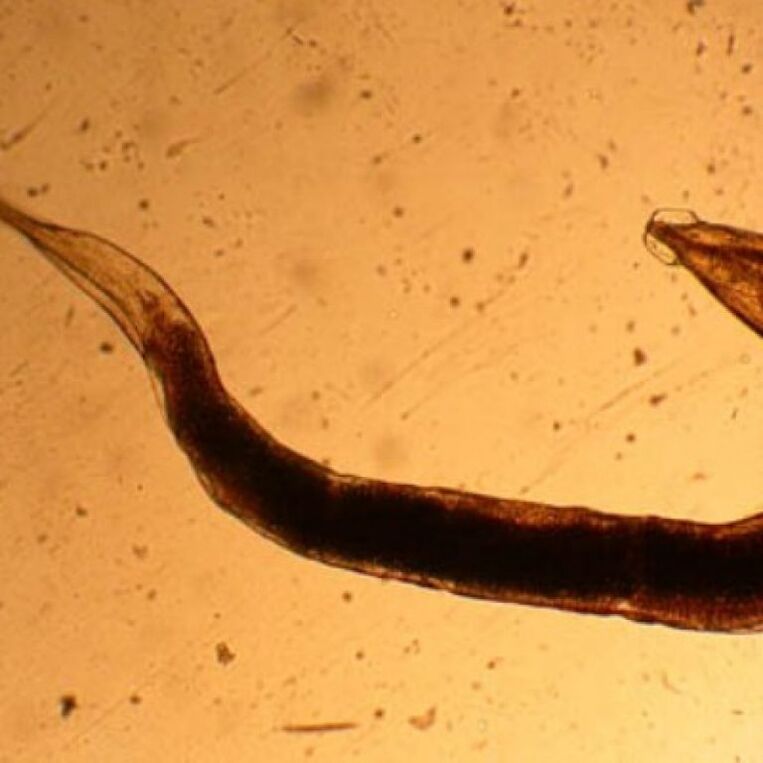
Worms
This is the most common parasite that enters the human body. In addition, even human-like primates may suffer from bowel disease. The worm is most commonly found in preschool children. Children from 1 to 10 years of age are sick.
When a healthy person comes into contact with an infected person without washing their hands (shaking hands, touching dirty linens, towels, etc. ), Pinworm infection occurs. In addition, pin worm eggs enter the human body together with food.
Important note: Insects (flies, cockroaches) can also carry worm eggs.
Adult women crawl out of the anus at night and lay eggs in the folds of the anal skin, which can cause severe itching. In addition, if the intensity of the worm invasion is already high, the patient may experience periodic pain in the lower abdomen. These symptoms of parasitic infection indicate the presence of pinworms in the body. They may be mixed with general fatigue and skin allergic reactions.
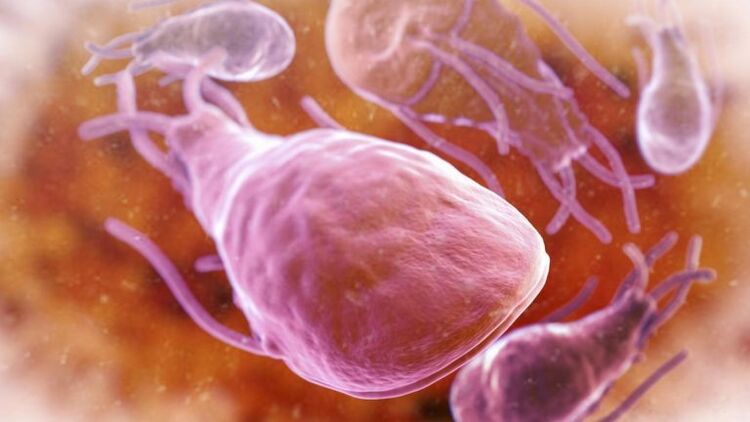
Giardia
Protozoa of the flagella genus. The localization of such parasites in the human body usually occurs in the small intestine. However, with the flow of blood, protozoa can reach the liver and gallbladder. Parasites enter the body through dirty hands, unwashed vegetables/fruits or drinking dirty water.
The symptoms of lamb parasites are:
- Pain in the right lower cartilage;
- Fecal disorders;
- Excessive deflation;
- Disgusting;
- Neurosis;
- Allergic manifestations on the skin.
A worm disease
Small human worms most commonly living in the small intestine. But at the same time, with the flow of blood, they can easily migrate to any organ. Usually located in the heart, lungs, liver and even brain.
Worm infections are caused by dirty hands, which may contain parasite eggs from vegetables, fruits, soil, etc. In this case, the symptoms of parasites vary according to the course of the disease. Therefore, during the migration of the larvae, the following symptoms of internal parasites will be noticed:
- Increased body temperature (38 degrees);
- Dry cough at night, shortness of breath;
- Swollen lymph nodes.
As the worm becomes deeper and deeper in the human body, the following symptoms will develop:
- Stool disorders (constipation and diarrhea);
- Neurological disease;
- Pneumonia;
- Heart failure;
- Disgusting;
- Vomiting;
- Often headaches;
- Stomach pain.
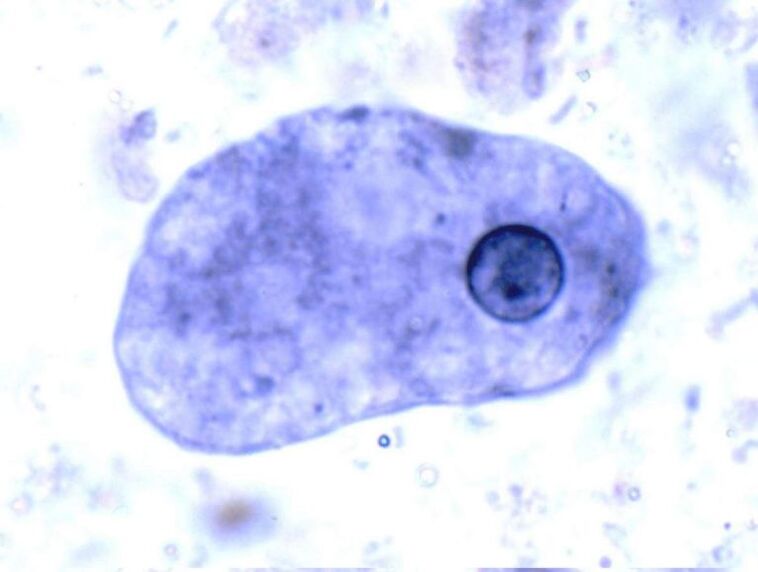
tissue amoeba
Amoeba is a parasite of protozoa. It affects the human body through dirty hands, using dirty food (vegetables, fruits, herbs) and even through anal sex. Flies can also carry amebiasis. Amoeba causes the formation of ulcers in the wall of the large intestine and further damages other organs and systems. In this case, the signs of internal parasites are as follows:
- stool with blood and mucus;
- Abdominal pain;
- Anemia;
- General weakness and fatigue;
- Abscesses are formed in those organs where parasites can exist.
Tosokara
Round worms provoke worm invasion, which is called toxoplasmosis. In this case, the parasite can be located in the intestines, eyes, and brain. Drug vehicles are dogs (dogs, wolves, foxes, etc. ). Infections occur through contact with sick animals or through indirect contact with their feces. This type of parasitic infection can cause various symptoms, depending on the organ in which the worm larva is located. Therefore, the symptoms of intestinal toxoplasmosis are as follows:
- Nausea and vomiting;
- Diarrhea and constipation;
- Abdominal pain.
With ocular toxoplasmosis, the patient has the following signs of parasitic infection:
- Decreased eyesight;
- Purulent discharge from the affected eye;
- Form ils on the eyelids;
- Redness of the eye sclera;
- Retinal detachment.
If the Toxoplasma gondii settles in the brain, the patient will show the following signs of internal parasites:
- headache;
- Dizziness;
- Increased intracranial pressure;
- Nerves and hallucinations;
- Loss of vision and concentration.
In this case, clinical manifestations are often confused with brain tumors.
- With cardiac toxoplasmosis, the patient will experience heart failure, such as tachycardia, irregular heartbeat, valve failure, and heart pain.
- If the worm settles under the skin, the patient will feel itchy, moving and red on the skin where the worm moves.
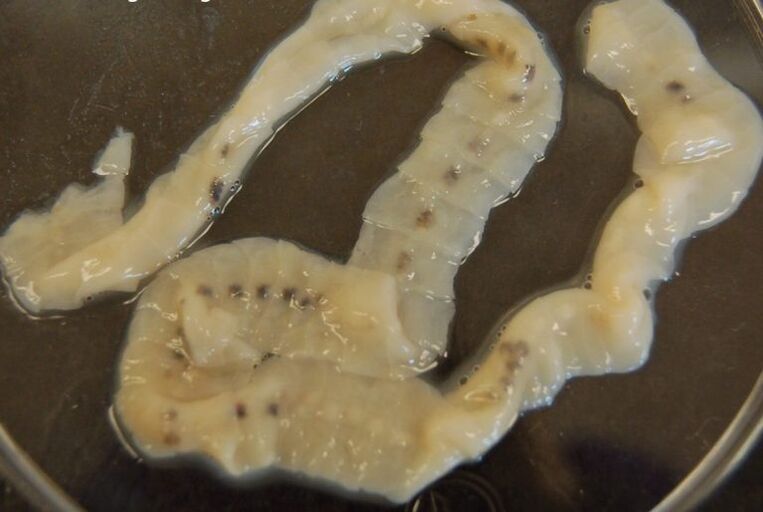
wide ribbon
The worm lives in the small intestine of its biological host. It reaches there through the mouth with contaminated food (fish, roe) or water. The signs of such worms are as follows:
- Abdominal pain;
- Disgusting;
- Persistent anemia cannot be corrected by iron supplementation;
- In the late stage of pathology, the patient develops intestinal obstruction due to the accumulation of a large number of parasites in the body.
Pork tapeworm
The worm lives in the bodies of livestock (rabbits, pigs), dogs and even camels. It enters the human body along with contaminated meat that has not been sufficiently heat treated. If adults are found in the patient, the diagnosis is "teniasis". If a worm is detected in the larval stage, it is diagnosed as "cysticercosis".
Important note: The patient with teniasis is dangerous to himself (swallowing parasite larvae in the brain, eyes, bones) and others.
The list of symptoms of parasites in the human body is as follows:
- Appetite drops sharply;
- severe headache;
- Abdominal pain;
- Fainted;
- Decreased vision (with ocular tendinitis).
Important note: The treatment of pork tapeworm can only be done in the hospital under the guidance of a specialist.
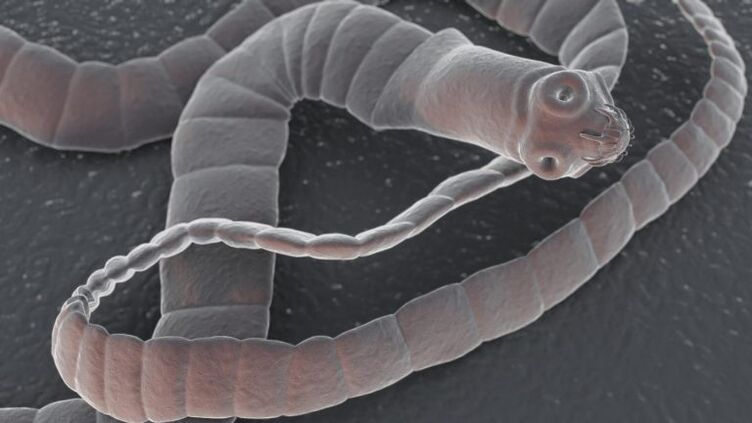
Cow tapeworm (tapeworm)
A parasite that lives in the human body. It reached the infected beef there. The list of signs of parasites in the human body is as follows:
- Loss of appetite, underweight;
- The chair is unstable;
- Abdominal pain;
- Severe allergic manifestations;
- Disgusting.
Important note: When using certain dewormers, the parasites will be released by themselves. In addition, its maximum length can be about 12 meters.
Glassworm and hookworm
These round parasites usually enter the human body through unclean hands and food or through contact with soil. The symptoms of such parasites in the human body are as follows:
- Appears on the body in the form of papules and vesicles (purulent acne);
- Severe dry cough, shortness of breath;
- Abdominal pain;
- Persistent anemia;
- Diarrhea;
- Disgusting;
- Loss of appetite.

Pneumococcus
This parasite belongs to the tail sheath group. At the same time, it is worth mentioning that worms are extremely dangerous to humans because they first form the main inflammatory foci in the liver and then transfer to other organs. Human infections occur by ingesting worm worm balls into the population. The most common situation is when cutting animal carcasses, during hunting, using herbs and berries collected in the forest that are not fully processed into food, and when they come into direct contact with infected pets. In this case, only an expert can evaluate symptoms and treatment strategies. The clinical situation of worm invasion is as follows:
- Nausea and specific ching gas;
- Pain in the lower right cartilage;
- Allergies;
- Severe skin itching;
- Parasite location and suppuration where the abscess erupts.
Important note: The location of this invasion is usually found in the lungs or brain. They just got rid of the parasite quickly.
Echinococcus
Dogs and cats are the carriers of Echinococcus oc. In this case, the parasite's person is just an intermediate host. The harm of Echinococcus e to humans is that worms can seriously affect a person's organs and systems, thereby forming cysts in them. In most cases, people who work with animals and slaughtered meat will be infected with Echinococcus cus. That is, when the carcass of an animal is cut and contaminated meat or water is eaten, the parasite can enter the human body. It is worth mentioning that there will be no signs of parasites in adults for a long time. When the symptom-free phase is over, the following clinical images will appear:
- Severe urticaria;
- Itchy skin;
- The soreness of the parasite larvae;
- Fever (hair cyst).
Esophagus
This worm can enter the human body along with contaminated poultry, fish or frog meat. You can also be infected with dirty water with worm larvae. The presence of these worms in the human body is manifested by the following symptoms:
- Severe dry cough;
- Soreness in the area where the parasite larva is located;
- Severe swelling;
- Severe skin itching;
- Increased body temperature.
Important: After a week, all symptoms will go away on their own, but they will appear regularly for many years. The great danger is that worms can damage the eyes and brain. This can be fatal.
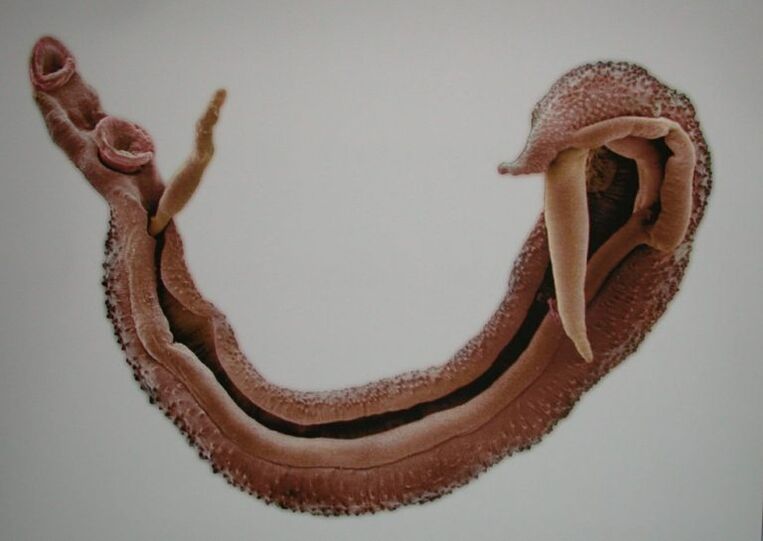
Schistosoma
Flux Worm. This is dangerous because it can even penetrate into the human body through intact skin. Infection occurs in dirty water (more common in Africa), washing clothes in dirty water or watering in the soil. In the acute phase of the invasion, the following initial symptoms appear:
- Hyperthermia (maximum 39 degrees and above);
- Papules form on the body;
- Severe skin itching.
In the chronic stage, the disease manifests itself in the form of symptoms such as prostatitis, colitis, vaginitis, ascites, and hydronephrosis. The urine can be analyzed to detect schistosomiasis.
Trichinella
A round parasite that parasitizes the muscles of the human body in the larval stage and migrates into the small intestine when it matures. Trichinella is deadly to humans. When you eat fried or cooked meat from wild and domestic animals infected with worms, you can become infected with this invasion. If the reader does not know how to determine whether this parasite is present in the body, then the pathological clinical photos will look like this:
- Vomiting and severe diarrhea;
- Abdominal pain;
- Loss of appetite;
- Muscle pain;
- Skin rash;
- Eyelid swelling;
- The temperature rose to 40 degrees.
Important note: Trichinosis is the only helminthic attack in the human body and is also treated with corticosteroids.
Knowing which parasites can live in the human body and how infections occur and what are the symptoms of worm infections, you can assure yourself and your loved ones that you will not be infected. If you suspect that you have been infected with one or another parasite, please seek professional help in time.

























